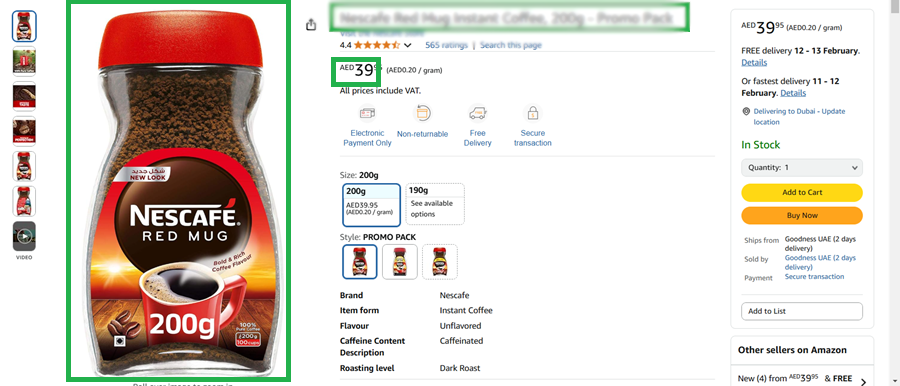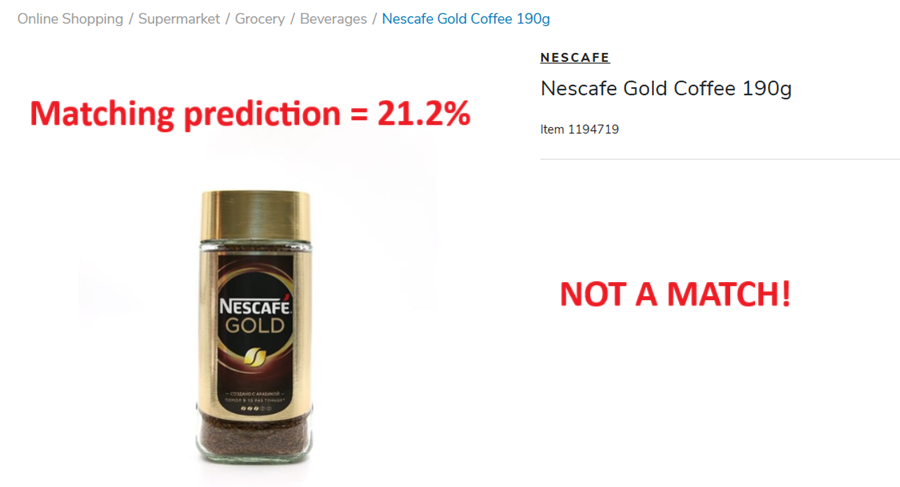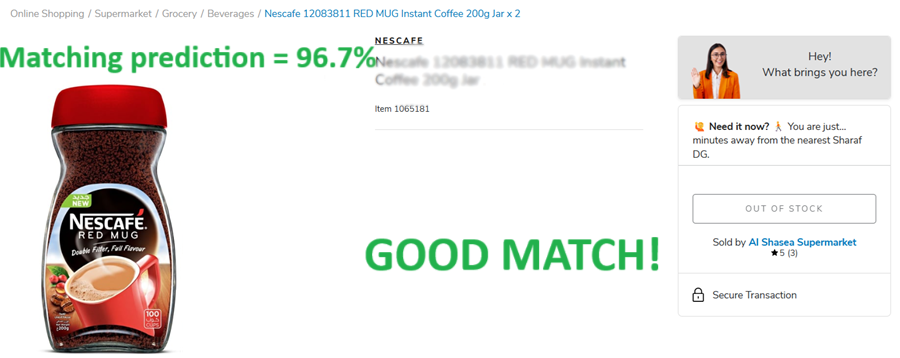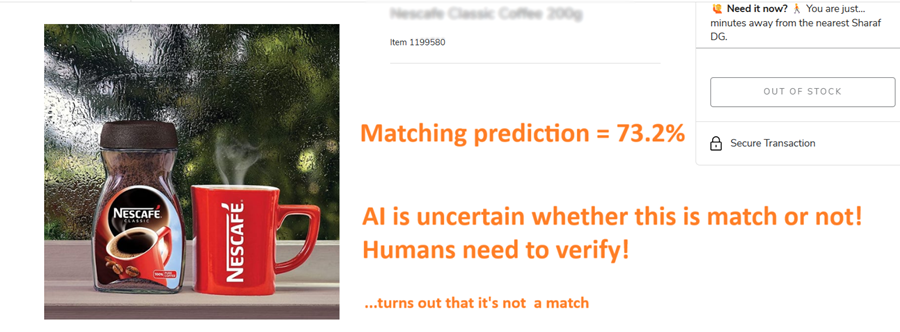We have been recently blogging about our latest efforts in order to build smarter and more efficient machine learning model for product matching. Today we are happy to announce that our latest tests showed that our enhanced AI model saves 75% of manual work related to product matching.
Lets see how the savings have actually been made:
API-based product matching explained
First of all, we will make use of the search logic implemented on a targeted website. For example, lets try to find a matching product for ‘Nescafe Red Mug Instant Coffee 200g’ on a popular Gulf marketplace.

Image 1 – Nescafe Red Mug Instant Coffee 200g product from Amazon.ae (sold at 39.95 AED) – that needs to be matched on targeted website
Obviously, searching manually on a marketplace with over 500K products (this is a rough estimation of products on the above mentioned marketplace) does not make much sense. That is why we may use built-in search feature of this marketplace, look for Nescafe Red Mug Instant Coffee 200g and go through the results.
The results we will be getting are
- Nescafe Powder 200g – 19 AED
- Nescafe Coffee 190g – 31.5 AED
- Nescafe Brazil 230g – 17.6 AED
- Nescafe Latte 148g – 12 AED
- Nescafe Irish 176g – 15 AED
- Nescafe Ginger 168g – 13 AED
- Nescafe Classic 200 – 26.8 AED
- Nescafe Instant Coffee 200g Jar – 36.5 AED
- Nescafe RED MUG Coffee 200g Jar – 27,25 AED
- Nescafe RED MUG Instant 200g Jar x 2 – 49.25 AED
Please note that the search has returned much more than 10 results, but we need to draw a line somewhere.
The trouble is – someone has to check these 10 matching candidates and verify if they correctly match the product we started from or not. And that someone so far was always human.
So, that human would need to carefully go through each of 10 candidates, and compare their product title, image, description and price to our original product, sold on Amazon.ae.
In some cases that comparison is relatively easy (as it’s obvious that 190g, 230g etc packaging is not the same as the original 200g. Further in some cases product images will be obviously different, so these ones will be easy to eliminate as well.
However, comparison process will take considerable time – one needs to open the browser, go to the candidate’s URL, wait till the page loads, and then check the image and other product specifics.
Although this task is not of high sophistication and can be outsourced to cheap labour countries like the ones in Asia – it will still take time, and costs.
Product Matching AI saves the day
What Product Matching AI does is establishing matching probability, in an automated way, based on 5 data inputs.
- Product URL
- Product name / title
- Product price
- Product description
- Product image
The result is a matching prediction score, assigned to each matching candidate. Let’s see it on the above example.
- Nescafe Powder 200g – 35.4%
- Nescafe Gold 190g – 21.2%
- Nescafe Brazil 230g – 19.8%
- Nescafe Latte 148g – 14.8%
- Nescafe Irish 176g – 13.6%
- Nescafe ginger 168g – 13.9%
- Nescafe Classic 200g – 73.2%
- Nescafe Instant Coffee 200g Jar – 75.1%
- Nescafe RED MUG Coffee 200g Jar – 96.7%
- Nescafe RED MUG Instant Coffee 200g Jar x 2 – 31.1%
As you can see, one candidate (coloured in Green) has scored an outstanding score. Such a score indicates a positive match.
7 candidates (coloured in Red) have scored rather low scores, meaning that we should not invest time checking these.
That leaves us with 2 candidates (coloured in Yellow) where prediction score is kind-of high (73.2%, and 75.1% respectively) where it would be advisable for human to doublecheck if the given candidate is a match or not.
As you can see, out of 10 candidates, we need to manually check only 2 – and that is a 80% save on work performed by humans.

Image 2 – Matching candidate which has received very low matching prediction score. Humans don’t need to spend time evaluating this candidate any further

Image 3 – Matching candidate which has received superb matching prediction score. Humans don’t need to spend time evaluating this candidate any further, we are positive that it’s a good match!

Image 4 – Matching candidate which has received matching prediction score which does not justify trusting AI decision – humans need to check if this is a match or not. Remember, the matching accuracy matters, so such cases better be checked by human QA.
We have performed the above test on nearly 20K products from various industries (toys, automotive, cosmetics, home appliances, sports, outdoors) and we have observed a 75% save. Remarkable, isn’t it?
So lets say you had a team of 10 people, working on product matching task for 1 month. And lets say they come from a low-wage country, so one’s persons monthly pay was 500 USD. That means Product Matching AI will help you save (500 x 10) x 0.75 = 3750 USD per month!

